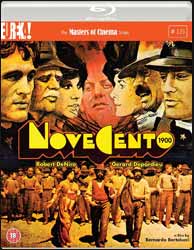|
Click here to return to the main site. Blu-ray Review
What makes a film an epic? How do we define such films? Is it in the film's length, rather than its quality or is it that the film has something monumental to say? If we look across the films which have been named as epic the one thing they have in common is not quality, but runtime. Bernardo Bertolucci’s Novecento (1900) certainly has the running time to warrant the term epic. Release in 1976, after his success with Last Tango in Paris, the film was long enough to warrant splitting into two (Part one 2 hr, 42 min, 09 sec. Part two 2 hrs, 34 min, 19 sec). The story looks at the changing face of the political landscape through the eyes of two children born in 1900. The first, Alfredo Berlinghieri (Robert De Niro) is the son of a wealthy land owner, part of his local aristocracy, although as he gets older and increasingly reluctant participant. The second is Olmo Dalcò (Gérard Depardieu) the son of a peasant. The story takes these two friends through the tumultuous days of the First World War and the rise of fascism in the nineteen thirties. The film closes in nineteen forty five and the downfall of Mussolini. Every great director has films which fail to match his best. There is much that is classic Bernardo Bertolucci. The cinematography is wonderfully evocative of the Italian countryside, the colour palette chosen to help the audiences feel the unremitting heat of both the environment and the characters interactions. Like Last Tango in Paris (1972) there were scenes in the original cut which were deemed to be too graphic, although their inclusion did not lead to the director’s arrest and criminal conviction as the anal scene in Tango did. Like The Last Emperor (1987), the film opens with a middle aged man looking back on his life and the part he has played in events which tore down old political and social structures and through a process of blood and pain finally replaced them, creating a sort of peace. While there is much to admire about the film, it does feel overlong for the material. Looking specifically at films which deal with power and corruption, Claude Berri’s duet of films, Jean de Florette (1986) and Manon des Sources (1986) come in at an hour less than 1900 and yet tell a much more compelling story of the power of wealthy land owners to arbitrarily crush those of a lower social standing as does Francis Ford Coppola’s Godfather trilogy. Not that the film lacked a good cast, as well as De Nero and Depardieu, you have Donald Sutherland playing the psychopathic fascist, Attila Mellanchini and veteran actor Burt Lancaster playing Alfredo Berlinghieri the Elder. Whilst De Nero is highly recognisable in the role, the young and dare I say slim Depardieu, is almost unrecognisable, which deals with a different kind of corruption. On the two disc set Blu-ray you have the option to view the film in its original Italian or a pretty good English dub, both tracks are Dolby 2.0. The set comes with a number of extras. 1900: The Story the cast (13 min, 56 sec) and 1900: Creating an Epic (14 min, 21 sec) has Bertolucci discussing why this became the next project after Tango and how the film came about, it’s nice but short. You also get the original Theatrical Trailer (2 min, 51 sec). On the second disc you get Bertolucci secondo il cinema (1976. 1 hr, 03 min, 46 sec), presented with an aspect ratio of 1.33:1, the overall quality is watchable but general poor with obvious damage to the print. The film was directed by Gianni Amelio and details the shooting of 1900; think very posh ‘making of’. Looking at Bertolucci’s cinema, this was an obvious attempt to detail the struggle between the left and right and because of Bertolucci’s own self-avowed Marxist leanings, the politics of the film fall heavily on the left. Obviously he set out to create an epic but the film is too weighed down with its own self reverence, leaving an epic film which is not as entertaining as Cleopatra (1963) a film from the era of epics or even Bertolucci’s own The Last Emperor (1987). 7 Charles Packer Buy this item online
|
|---|

